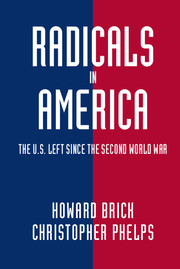Book contents
- Frontmatter
- Dedication
- Contents
- Introduction: Margin and Mainstream in the American Radical Experience
- 1 War and Peace, 1939–1948
- 2 All Over This Land, 1949–1959
- 3 A New Left, 1960–1964
- 4 The Revolution Will Be Live, 1965–1973
- 5 Anticipation, 1973–1980
- 6 Over the Rainbow, 1980–1989
- 7 What Democracy Looks Like, 1990 to the Present
- Conclusion: Radicalism's Future
- Acknowledgments
- Bibliography
- Index
4 - The Revolution Will Be Live, 1965–1973
Published online by Cambridge University Press: 05 August 2015
- Frontmatter
- Dedication
- Contents
- Introduction: Margin and Mainstream in the American Radical Experience
- 1 War and Peace, 1939–1948
- 2 All Over This Land, 1949–1959
- 3 A New Left, 1960–1964
- 4 The Revolution Will Be Live, 1965–1973
- 5 Anticipation, 1973–1980
- 6 Over the Rainbow, 1980–1989
- 7 What Democracy Looks Like, 1990 to the Present
- Conclusion: Radicalism's Future
- Acknowledgments
- Bibliography
- Index
Summary
The revolution will not be televised.
The revolution will not be brought to you by Xerox
in four parts without commercial interruptions…
The revolution will be no re-run, brothers.
The revolution will be live.
– Gil Scott-Heron, “The Revolution Will Not Be Televised” (1970)In spring 1968, the “Americong” – an inversion of Viet Cong, as Americans called the National Liberation Front in Vietnam – shocked the University of Pennsylvania by announcing a rally at which “home-made Napalm” was to be applied “on the flesh of a dog.” The Ivy League campus had already seen A. J. Muste address 1,200 at a 1965 teach-in, historian Gabriel Kolko lead a campaign of faculty and students that persuaded trustees to end secret chemical-biological weapons research in 1967, and protesters object to recruiting by Dow Chemical, napalm's manufacturer. Four years later, a photograph of nine-year-old Phan Thi Kim Phuc running naked down a road with burnt skin hanging from her back would epitomize the effects of the flammable jellied gasoline, but even in 1968, to napalm a dog was understood as appalling. At the appointed hour, two thousand people turned out to object – only to receive this message: “Congratulations, anti-napalm protest! You have saved the life of an innocent dog. Now your efforts should turn to protesting Dow Chemical and the U.S. government's continued use of this genocidal weapon against the civilian population of a tiny country 10,000 miles away.”
“The Americong” was 25-year-old Steven Kiyoshi Kuromiya, a member of Students for a Democratic Society (SDS) who early in the decade had taken part in Student Peace Union picketing against nuclear testing, a Congress of Racial Equality (CORE) sit-in on Maryland's highway, the 1963 March on Washington, and the 1965 Selma, Alabama, civil rights march. In 1966, Kuromiya started the Free University of Pennsylvania, making use of empty classrooms to offer radical classes. By 1968, he was growing his hair long and experimenting with psychedelics. Soon he would drop his first name and be known only by his Japanese names as his Asian American pride increased. His napalm dog fantasia showed a rare apprehension that consciousness is a matter of perspective, not just information, perhaps a function of his outsider status. Born in a relocation camp in Wyoming during the Second World War, he had known since he was nine, living in California, that he was attracted to other boys.
- Type
- Chapter
- Information
- Radicals in AmericaThe U.S. Left since the Second World War, pp. 121 - 172Publisher: Cambridge University PressPrint publication year: 2015



